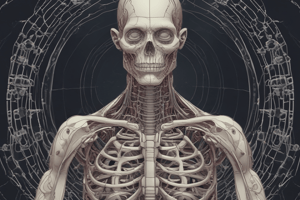Podcast
Questions and Answers
What does gross anatomy focus on?
What does gross anatomy focus on?
- The study of small structures
- The relationships among microscopic structures
- The study of cells
- The study of large, easily observable structures (correct)
Which subdivision of physiology focuses on the functions of the nervous system?
Which subdivision of physiology focuses on the functions of the nervous system?
- Exercise physiology
- Endocrinology
- Cardiovascular physiology
- Neurophysiology (correct)
What does pathophysiology study?
What does pathophysiology study?
- Normal physiological traits without abnormalities
- The relationship between body functions and disease conditions (correct)
- The basic cellular structures and their functions
- The overall functioning of body systems during exercise
Which of the following describes cell physiology?
Which of the following describes cell physiology?
What is the primary focus of respiratory physiology?
What is the primary focus of respiratory physiology?
Which term refers to the study of how the cardiovascular system works?
Which term refers to the study of how the cardiovascular system works?
Which of the following describes microscopic anatomy?
Which of the following describes microscopic anatomy?
What does systems physiology analyze?
What does systems physiology analyze?
Which subdivision of anatomy focuses on structures that can be observed without the use of a microscope?
Which subdivision of anatomy focuses on structures that can be observed without the use of a microscope?
What is the main purpose of pathophysiology in medical studies?
What is the main purpose of pathophysiology in medical studies?
Which of the following terms is related to the function and structure of cells within the human body?
Which of the following terms is related to the function and structure of cells within the human body?
What does exercise physiology primarily focus on?
What does exercise physiology primarily focus on?
Which subdivision of physiology examines the interactions of the cardiovascular system with other systems?
Which subdivision of physiology examines the interactions of the cardiovascular system with other systems?
Which of the following best defines neurophysiology?
Which of the following best defines neurophysiology?
Which term refers to the structural study of tissues in the human body?
Which term refers to the structural study of tissues in the human body?
What aspect does immuno-physiology focus on?
What aspect does immuno-physiology focus on?
Which area of physiology involves understanding how the renal system handles metabolic waste products?
Which area of physiology involves understanding how the renal system handles metabolic waste products?
Which of the following phrases best describes gross anatomy?
Which of the following phrases best describes gross anatomy?
Flashcards
Anatomy
Anatomy
The study of the structures of the human body and their relationships.
Physiology
Physiology
The study of how body structures function together to create a whole.
Gross Anatomy
Gross Anatomy
The branch of anatomy that studies structures visible to the naked eye, like organs and bones.
Microscopic Anatomy
Microscopic Anatomy
Signup and view all the flashcards
Cell Physiology
Cell Physiology
Signup and view all the flashcards
Systems Physiology
Systems Physiology
Signup and view all the flashcards
Exercise Physiology
Exercise Physiology
Signup and view all the flashcards
Neurophysiology
Neurophysiology
Signup and view all the flashcards
What is Anatomy?
What is Anatomy?
Signup and view all the flashcards
What is Physiology?
What is Physiology?
Signup and view all the flashcards
What is Gross Anatomy?
What is Gross Anatomy?
Signup and view all the flashcards
What is Microscopic Anatomy?
What is Microscopic Anatomy?
Signup and view all the flashcards
What is Cell Physiology?
What is Cell Physiology?
Signup and view all the flashcards
What is Systems Physiology?
What is Systems Physiology?
Signup and view all the flashcards
What is Exercise Physiology?
What is Exercise Physiology?
Signup and view all the flashcards
What is Neurophysiology?
What is Neurophysiology?
Signup and view all the flashcards
What is Endocrinology?
What is Endocrinology?
Signup and view all the flashcards
What is Cardiovascular Physiology?
What is Cardiovascular Physiology?
Signup and view all the flashcards
Study Notes
Anatomy and Physiology
- Anatomy is the study of body structures and their relationships.
- It uses dissection, imaging, and Greek terms like "tomy" (cutting) and "ana" (apart).
- Subdivisions:
- Gross Anatomy (Macroscopic Anatomy): Study of large structures visible to the naked eye (e.g., heart, bones).
- Microscopic Anatomy (Cytology and Histology): Study of small structures like cells and tissues.
Physiology
- Physiology studies how body structures function as a whole.
- It covers normal adult functions and variations, including genetic variations.
- Subdivisions:
- Cell Physiology: Studies the structure and behavior of human cells.
- Systems Physiology: Studies the overall function of each body system.
- Pathophysiology: Identifies if any body parts' condition is related to any form of pathology, condition, or sickness/disease.
- Exercise Physiology: Studies kinetic physiology or body movement.
- Neurophysiology: Studies the function of the nervous system.
- Endocrinology: Studies the function of the endocrine system.
- Cardiovascular Physiology: Studies the cardiovascular system (heart and blood vessels), including oxygenated blood delivery, hormone/nutrient transport, and waste removal.
- Immunophysiology: Studies how the immune system affects the body.
- Respiratory Physiology: Studies gas exchange and its impact on the body.
- Renal Physiology (Excretion and Reabsorption): Studies the excretory system (kidneys) and how it excretes metabolic waste and regulates fluid balance.
- Reproductive Physiology: Studies the reproductive system, including offspring creation and secondary sexual characteristics.
Studying That Suits You
Use AI to generate personalized quizzes and flashcards to suit your learning preferences.




